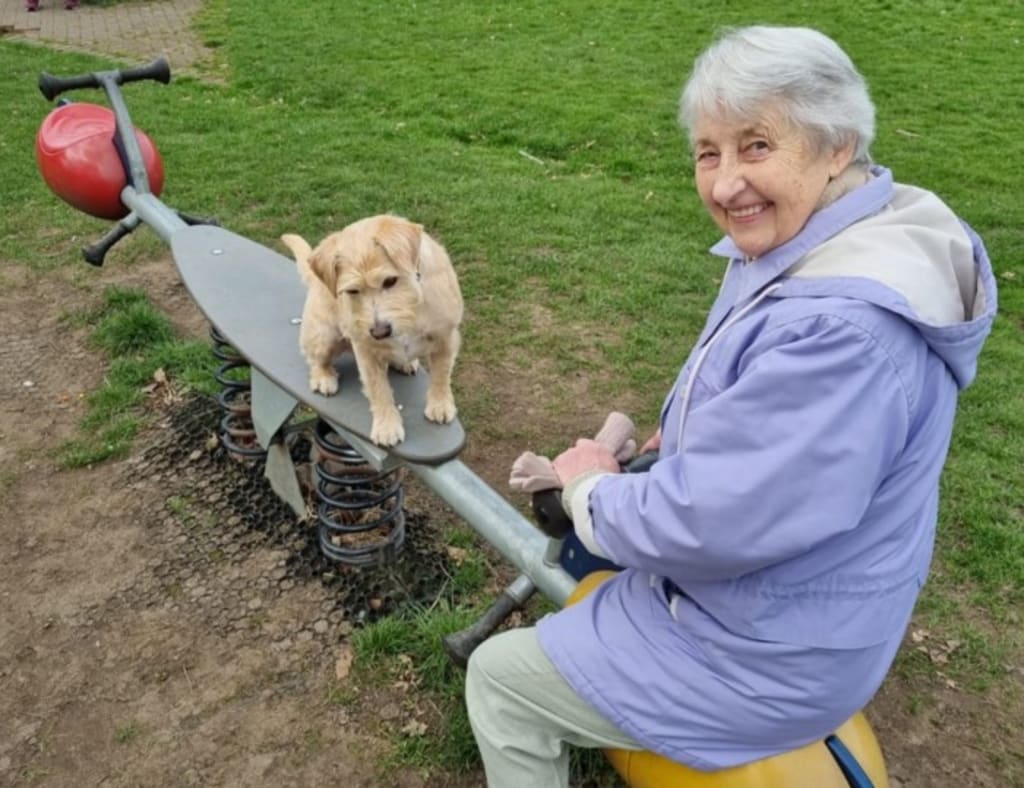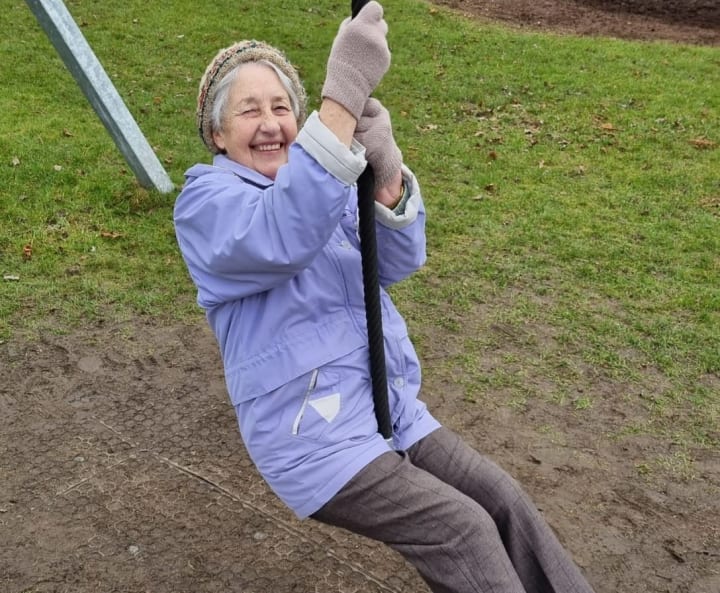The Happy Way to Live With People Who Suffer Dementia
3 rules you need to remember when they forget

You’d like my mum
If you met her, you’d want to hug her.
When we were kids, we’d frustrate the life out of her, the four of us. My older brother Kenny was the worst. He’d invite his friends in to play on our miniature snooker table set up in our dining room, then he’d disappear outside. Mum would hear a ruckus and there would be half a dozen kids in there who she didn’t know. She’d offer them a drink of juice and buttered bread and jam.
Her father died when she was young. She had a hard upbringing, money was tight. This, she explains, is why she is so frugal. She penny-pinches. She’ll walk an extra mile to save tuppence on a tin of soup. Yet, she is the most generous soul. Nobody goes hungry in her house. She’d give you every pound from her purse if you need it.
She’s had a poor memory for decades. It is the only thing she doesn’t forget to tell us.
“Oh my memory, it’s getting terrible,” she’d say, furrowing her brow.
“Aw Mum,” I’d say as I gave her a cuddle, “just forget about it.”
That made her laugh.
Her memory has deteriorated. She repeats the same questions over and over. Thousands upon thousands of times.
“What time does Joanna finish her work?”
“Did you know my neighbour died?”
“Where are my glasses?”
Sometimes she has them in her hand.
It’s her turn to frustrate the life out of us.
What dementia takes away
We could be wild when we were kids. Kenny would do anything to get out of doing his chores and this would annoy her.
“Wait until your dad gets home,” and he’d annoy her all the more. “I’ll take my slipper to you,” she’d say.
To make a point, she’d remove a slipper from her foot and brandish it at him. But Kenny knew she wouldn’t hurt him. Mum doesn’t have an ounce of malice in her body.
He’d stick his bum out, inviting her to skelp his backside, giggling. Mum couldn’t help herself, she’d step forward to make good on her promise, taking a half-hearted swipe at his buttocks. Telegraphed. Kenny would pull his posterior out of the way and hoot like a fanatical goose.
The game was in play. We’d egg him on by laughing — it was funny.
Kenny would run away cackling in delight, chased by our braw wee maw, slipper in hand. We read the subtle nuances, the twitch at the side of her mouth, the crease around her eyes. Soon she could not contain her own merriment, and laughter erupted from her mouth. She was a child again, we were her friends, and we loved to laugh together.
She remembers those times. She doesn’t remember why she opened the fridge. Now, the only chasing she does is in her head — looking for answers that play hide and seek.
This year, both mum and dad caught Covid-19. We took turns providing 24/7 care. Living in with them, two weeks at a time. We were lucky, they survived. They made it. Just.
I wondered how much Covid-19 had affected her mind. People describe the effect of the virus on their brains as a fog. I imagine this is like the effect of dementia. I was curious. Was her memory getting worse because of her dementia, or was it getting better as she recovered from the virus?
I sat her down and got her to write a letter to herself. She has a wonderful neat cursive script. I asked her to write all the things she remembered about her life: when she was born, what jobs she did, when she got married, her children’s date of birth, who they married, names of her grandchildren.
I’d test her again in a week and see if her memory improved or deteriorated.
She struggled. As the page filled, her anxiety grew. It upset her when she couldn’t remember the month or day her children were born. This was important to her. She loves us all, we know this from the creases in her eyes and the wide smile when she sees us. She brims with gratitude. She is ever so thankful.
“What would we do without our wonderful family?” She repeats on a loop to my dad.
A week later, she stopped halfway through writing. Tears ran down her cheeks. She produced a tissue from her pocket and blew the residue from her nose. My mum had a sense something was wrong, and it churned her stomach. It filled her with despondency and it welled until the sadness spilled from her eyes and nose.
I never asked her to write a letter again.
No more tests. No more questions. It upsets my mum when she can’t remember things.
She can recall playing with her friends from school, how she got her first job, and that she was once club champion at her bowling club. She can’t remember what she had for dinner last night or where she put the newspaper.
If I ask her a question, no matter how innocuous, it reminds her she has a problem. It’s upsetting for anyone when simple things are beyond their recall. When the tip of the tongue is the only thing that sees the light of day.
Rule №1 — Don't Ask Questions
Questions are toxic. Even simple questions like, ‘Would you like a cup of tea?’ She doesn’t know if she had one already or if there are tea bags in the house. Does she have the time to sit and have a cup of tea? She gets confused because she can’t recall what she was going to do.
Psychologist and author Oliver James confirms this in his book Contented Dementia.
“Cease asking your client any direct questions at all and aim never to ask them another one.”
By asking questions, I reminded my mum of her failing memory. She became ill at ease. She doesn’t know what is wrong, but she knows something is desperately hindering her recall of recent events. She feels wretched when it spreads to things it is important to her to remember: birthdays, names of her grandchildren, what age she married.
It is a simple rule, but it isn’t an easy rule.
Avoiding asking questions takes practice. You need a strategy for reframing the question. Instead of asking my mum if she would like a cup of tea, I’d say, “I could do with a cup of tea.” I tried implanting the thought using statements. Sometimes it worked, sometimes it didn’t. It is not the end of the world if you get this wrong. When it didn’t work, I’d try something else.
“I’ll make a cup of tea,” worked best.
Instantly she would say, “No, no. I’ll make it.”
She likes to keep herself occupied, and any disquiet she had about her memory faded away.
“Would you like it in a big mug or a small cup?”
Then, she’ll put out milk and sugar — even although none of us takes sugar. It doesn’t matter, she is back in control.
I had to find ways of nudging her in the right direction. If I thought some fresh air would do her good, I wouldn’t ask her if she wanted to go for a walk. I made observations.
“It’s a lovely day out there.”
“I could do with some exercise.”
“I think I might go for a walk,” or
“I bet the park will be nice just now.”
All gave the desired result.
Rule №2 — Mum is always right
Mum goes through the house secretly switching the thermostats on the radiators to a lower setting. It’s only when you see a goose pimple on your arm you realise you are cold. And when you check the thermostats, they are all turned down. I rarely catch her doing it.
“It’s cold in here,” I’ll say
“Would you like me to make you a hot water bottle?” She replies.
Mum obsesses with the heating. She will stare at the boiler for some minutes, confused. Then she will turn the dial down to save money. I typed up a notice and stuck it above the controls.
Do not touch this boiler. It will come on when the temperature goes too low and will switch off when the house is hot. Leave the dial set at ‘E’, this is the most economical setting.
It didn’t matter, she still turned the dial down.
I tried to persuade her to leave it alone. I explained how it worked. She didn’t understand. She remembered the old boiler, the one my dad had replaced five years ago. She thinks something is wrong with this one.
It affects her well-being. She doesn’t like the feelings of angst that accompany her not being in control. It niggles that she might waste money. She believes what she believes.
“Mum, it’s at the right setting, please leave it.”
“But that can’t be right, it’s going off and on by itself.”
“Yes, it does that. It switches on automatically when the temperature goes too low and goes off when it reaches the right temperature.”
“I’ve never heard of that.”
“Read the instructions, Mum.”
She read my notice, but it didn’t compute. We kinda had an argument. She was frustrated, and it frustrated me that she was frustrated.
She asked how much I pay for my gas and electricity and winced at the answer. It is twice as much as her bill. I explained my house is twice the size and I have more people living there. A rational explanation, but it didn’t make an iota of a difference. Logic and reason are as useless as the B in ‘dumb’, ‘thumb’, and ‘succumb’. As pointless as a politician’s conscience.
Mum produced her bank statements, rifled through them until she found a debit entry; an old utility supplier from three years ago.
“Look,” she said, “this is who you should get your gas and electricity from. They are charging less than half the price you are paying.”
I had a sudden realisation, an epiphany if you like.
It isn’t about being right, making a point or getting her to understand. It is about how she feels. It is about accepting her as she is and making her happy. I reversed my tack and changed my tact.
“Wow Mum, you are right. Let me get a note of that company.”
I got a pen and wrote it down.
The change in her was instantaneous. She no longer felt like a confused old biddy. She was a mum doing what mums do, advising her child how to save money. That’s always been her area of expertise.
That simple change fostered feelings of worth and well-being. I thanked her, told her I loved her and gave her a hug. Oh my, did that light up her face.
It was an apocalyptic revelation.
I had been incredibly naïve. As a police officer, I spent 30 years of my life negotiating with crazy, stubborn, and stupid people — and they were just my senior officers. You can’t change their minds with reason and logic. It doesn’t work with them, and it doesn’t work mum anymore.
Jan Hall cites a carer’s experience in her book, Dementia Essentials.
“…when the dementia started it became much more difficult to deal with her because she would be absolutely certain she was correct. We would end up having large rows over silly things like the colour of my trousers or whether a picture in the house was hanging straight. I started thinking. ‘What the hell is the matter with this woman.’”
You can and must avoid direct confrontation. Agree with what she says. Feelings are important — much more important than facts. Treat her with respect and dignity.
She may not know what day it is, but she knows how you make her feel.
Rule №3 — Embrace the repetition
It’s all too easy to lose your rag. Mum repeats the same questions over and over. Recites the same stories I’ve heard tens of times a day, hundreds of times a week, and thousands of times since I graduated from shorts to trousers.
“What time does Joanna finish her work?”
“That’s the 20th time you have asked me that, Mum.”
“Well, what did you say?” She turned from the sink, pointed at me and added, “that’s 21.”
Mum always had a mischievous sense of humour. I couldn’t help myself, I burst out laughing. Mum joined in. And when our laughter died down, she asked again.
She was serious about wanting to know. It was important to her. She felt guilty about the time I spent with her, concerned I wouldn’t be there for my wife when she got home.
“So, what time does she finish her work?”
The question will not go away until something changes in the way she feels. This was my challenge. I had to test out different replies.
“Three o’clock,” — “She’s off today,” — “Four o’clock.”
These answers led to supplementary questions, then a few minutes later we were back at the start again.
“What time does Joanna finish her work?”
“Just her usual time, Mum.”
Bingo! The conversation moved on.
Embrace the repetition. Treat it as a game. The challenge is to find the answer that satisfies her curiosity. Take a note of what works.
I’m lucky, we have a family who rallies around and shares the care. Mum goes through the same conversations and stories with us all. Get the others on board, whether that be your family, her friends, or paid carers.
Get everyone involved.
Everyone can help find the best solutions. Centre your attention on how she feels, on what makes her happy. And there is the crux. Mum is happiest when she is rattling out her old stories.
She tells them over and over. These stories have solid neural networks. It reinforces the pathways to her memories with every telling. No wonder she can’t remember what she had for breakfast, that pathway is like she is walking through a virgin jungle. The vegetation folds back over as she passes.
How she got her first job is a tale she has repeated so many times: it is no longer a pathway — it’s a ten-lane motorway. There is no effort needed for her to recall the story, and that is why she loves the telling. It makes her feel good, remembering.
“Implausible though it may seem, repetition is a major source of well-being for clients and once you get it working for you, it soon becomes a lifeline. It is just a matter of finding out exactly what you need to repeat.” — Contented Dementia
Embrace the repetition. Show an interest, nod your head as if it were the first time you heard it. Have the good grace to stay silent and the patience to let her recount the entire story.
Mum is proud of her tale, I’ve heard it more than a few times so I know how it ends — it ends with a big smile and a giggle.
Final thoughts
Applying these three rules has changed my mum and made her happier. When she is happy, she is a delight. We sing, we play eye-spy, and we share secrets like little girls at a sleepover.
Sometimes I listen to her questions and sing the answers back. She joins in. Invariably one of us sings something funny, and we burst out laughing. She often continues by singing a nursery rhyme from her youth — singing is a trigger for happy memories.
My mum’s dementia will probably worsen. As a family, there are preparations we need to make. We need to read up, seek help and advice. We need to discuss and agree the what's best for mum, and what’s best for us too.
In the meantime, apply the three rules:
- Don't ask questions.
- Mum is always right.
- Embrace the repetition.
And I’ll add a fourth.
- 4. Have fun.

About the Creator
Malky McEwan
Curious mind. Author of three funny memoirs. Top writer on Quora and Medium x 9. Writing to entertain, and inform. Goal: become the oldest person in the world (breaking my record every day).







Comments
There are no comments for this story
Be the first to respond and start the conversation.